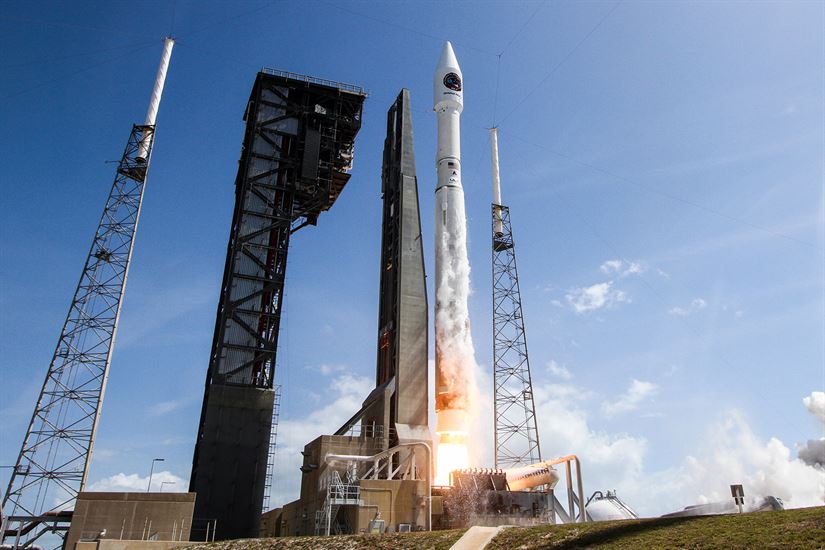Air Force Gen. John Raymond, commander of Air Force Space Command, and Air Force Lt. Gen. David Buck, commander of the Joint Functional Component-Space for the U.S. Strategic Command, appeared before the House Armed Services Committee earlier this week to testify on the state of national security as it pertains to America’s orbital and space-based assets.
The generals made clear their position that orbital assets like surveillance and communication satellites play a vital role in every operation conducted by the United States and its allies, and that defending those assets must be made a priority in the years to come.
“Today there is nothing we do, and I repeat, nothing we do as a joint force that isn’t enabled by space,” Raymond said. “Integration has been our strength [but] we find ourselves at the intersection of high reliance and vulnerability in the space domain.”
General Raymond explained to the Committee that space is a “warfighting domain” just like the air, land, and sea we’ve long become accustomed to thinking about it in a strategic and defensive way. Potential adversaries like China and Russia have already begun working to develop equipment designed to “deny the United States access to and benefits of the space domain,” which calls on the United States to take action in order to prevent that from occurring.
“Let me be very clear; we do not want a conflict that extends into space,” Raymond said, “but one way to keep that from happening is to make sure that we’re prepared for it and [can] fight and win that conflict if it were to occur.”
The general laid out a series of short-term goals the United States needs to prioritize in order to ensure it remains strategically viable in the event a conflict reached the orbital space above our heads. Included in those goals is to operationalize the National Space Defense Center, improve our situational awareness of space, design our space architecture with defense in mind, and to continue to professionally develop Air Force Space Command airmen.
“This is a challenge because our national security space architecture and processes were largely conceived to provide services or commodities during an era when our most significant orbital threat was debris,” General Buck told the panel.
Buck then called on the House to help to ensure that the United States continues to strive to improve our space presence in order to deliver “next-generation battle space awareness and command-and-control capability.” He also recommended a review and update of authorities pertaining to space-based warfare, including the rules of engagement for space operations.
Betty Sapp, director of the National Reconnaissance Office, also participated in the hearing, bolstering the two general’s claims with her own concerns about allowing the United States to fall behind in what may be the most important sector of warfare in the coming years.
“I believe we have not made the investment that would indicate space is a priority or fundamental to the U.S.,” she said.
“Our requirements, budget and acquisition processes are disconnected and none of them moves quickly.” Sapp added. “… We must have processes that are integrated, that move faster and that demonstrate greater risk tolerance. We must recommit to space as a national priority and imperative.”
Already have an account? Sign In
Two ways to continue to read this article.
Subscribe
$1.99
every 4 weeks
- Unlimited access to all articles
- Support independent journalism
- Ad-free reading experience
Subscribe Now
Recurring Monthly. Cancel Anytime.
It is widely expected that the coming years will see an explosion in civilian and commercial satellite launches, with experts predicting as many as 9,000 new launches in the next ten years; a stark uptick from the 1,500 launched in the last ten. Because of this influx of orbital equipment and the efforts of near-peer competitors like Russia and China to produce space-based weapons, it has become paramount that the United States military establish high-quality observational and defensive capabilities in orbit, according to the testimony provided to the House.
John Hill, performing the duties of deputy assistant secretary of defense for space policy, concluded the hearing by explaining the importance of strategic space security “in an era when Russia and China present anti-access area-denial strategies intended to prevent or counter U.S. intervention in crises or conflicts.”
He explained that the Defense Department still values diplomatic solutions above all overs in terms of international disputes, but that the “U.S. space posture underwrites deterrence by enabling the military to globally project power, rapidly respond to crises, swiftly and precisely strike and simultaneously command forces in multiple theaters.”
Because America’s potential opponents are aware of the U.S.’ reliance on space based communications and surveillance, it could easily be seen as a strategic vulnerability waiting to be acted upon by our nation’s enemies.
Hill added, “Disabusing them of such misguided notions is a strategic priority.”
Image courtesy of United Launch Alliance










COMMENTS